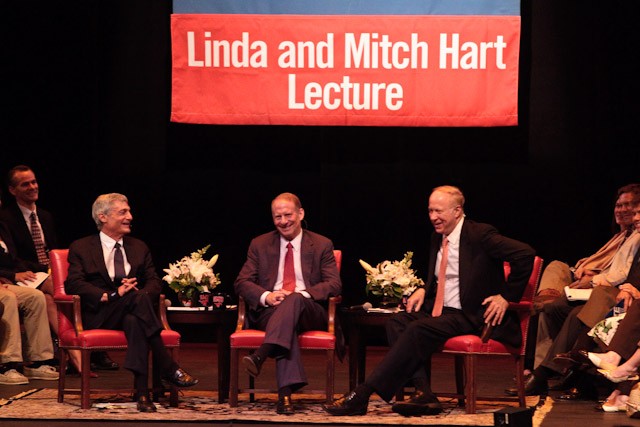
Robert Rubin, from left, Richard Haass and commentator David Gergen speak at the Linda and Mitch Hart Lecture, as part of the Willis M. Tate lecture series Tuesday evening in McFarlin Auditorium. (MICHAEL DANSER/ The Daily Campus)
The Willis M. Tate Distinguished Lecture Series began another year Tuesday. Audience members, who filled McFarlin Auditorium, were excited for the first of eight Tate Lectures for the 2010-2011 season.
The opening lecture for this year included Richard Haass, president of the council on foreign relations; Robert Rubin, the co-chairman of the council on foreign relations; and the moderator for the evening, David Gergen, a senior political commentator for CNN.
Their lecture, “The Evolving International Landscape,” informed the crowd of economic changes in the U.S. as well as outside of its borders.
Earlier in the day, the three men took part in the Student Forum at Hughes-Trigg where 250 local high school and SMU students were able to ask the lecturers and moderator questions in an informal setting.
Rubin and Haas both had opinions on some of the problems facing Americans today, specifically the problems facing the crumbling economy.
Gergen, who has advised four U.S. Presidents, acknowledged the fact that the U.S. is in a volatile economic situation while also posing questions to the lecturers.
Haas, an author of 11 books, pointed to two ways the 2010 decade could end up being a “lost decade” in U.S. history.
He stated that if the U.S. continues to build a large deficit, other countries and outside companies might distance themselves from the U.S.
Secondly, if another major crisis, specifically a war with Iran, were to happen, the cost of oil could triple.
With no other rival super powers to contend with, like in the Cold War or World War II, Rubin believes the U.S. is the only one to blame for its economic problems, especially in terms of the budget deficit.
Rubin said that an economic reform for the U.S. is “extremely doable” but is going to be difficult politically to maneuver.
Rubin remains skeptical of Republicans and Democrats finding a bipartisan solution for the economy.
The three men continued to point out additional reasons as to why the economy is struggling and ways the government could resolve these problems with cooperation across party lines, but were generally pessimistic of these possibilities.
After talking to freshman Paul Curry it is clear that the Tate Lectures are appealing to students who are looking for an alternative way to further their knowledge of important issues of today.
“Seeing as the topic of the lecture is my major, I think the Tate Lecture Series is another reason for me to appreciate the education SMU gives me,” Curry said.
He recognized this is not an opportunity that most schools can give their students.
“What other freshman could see these important people in person?” he said.








